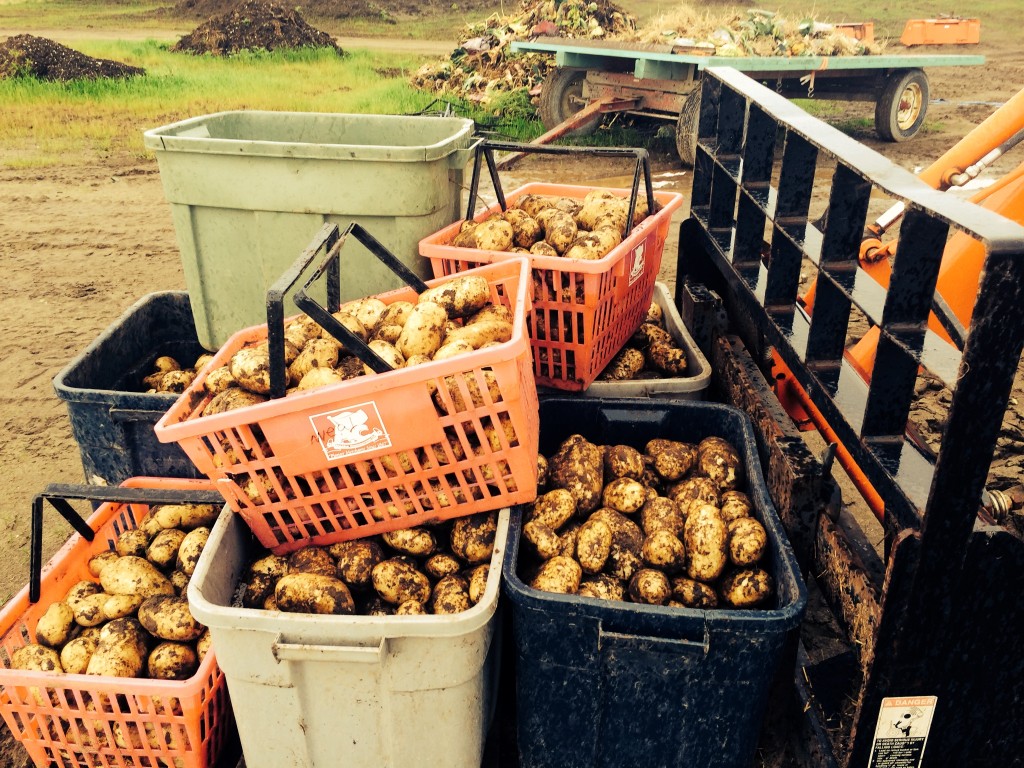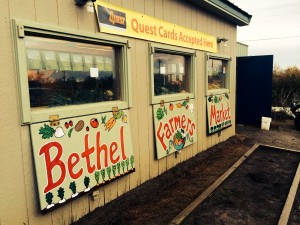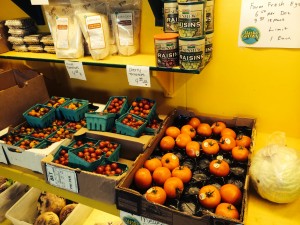Meyers Farm in Bethel recently shipped about 500 pounds of vegetables to the Cordova School District. The order was made possible through a program that reimburses Alaska school districts that buy food grown in state.

The potato harvest is underway at Meyers Farm in Bethel. Farmer, Tim Meyers uses a machine to dig up the big, golden tubers, and now he’s dropping them into totes. He loads the totes equaling about 800 pounds of potatoes onto a tractor and drives them over to a machine he built to wash them.
The organic farm has been operating in Bethel since 2002. They sell hundreds of pounds of vegetables that they grow on the 15-acre farm at a stand along with organic produce that can’t be grown in Bethel,
that’s flown in from a Seattle supplier. Large orders have not taken off because of pricey shipping costs. But a state of Alaska program aimed at providing Alaska-grown produce to schoolchildren is changing that. Meyer just got his first big order of the year.

“Got a big order going to Cordova: 100 pounds of cabbage, 100 pounds of carrots, 100 pounds of onions, 50 pounds of beats and 50 pounds of cauliflower,” said Meyers.
The order is from the Cordova School District. And it’s happening because of a state program called Nutritional Alaskan Foods in Schools, a pilot program that reimburses districts for buying locally grown food and pays to ship it. Through the program, schools can purchase Alaskan fish, shellfish, livestock, poultry, grains, milk, fruits and vegetables as well as Native Produce and berries. Debi Kruse administers the grant program for the state.
“This is a 3-million dollar appropriation that the legislature has made. Each school district, the 54 school districts of the state are allocated a percentage of those 3-million dollars and then awarded a grant agreement for that amount of money. So it varies by size and region,” said Kruse.
The program has a dual purpose, Kruse says.
“First of all, it’s to help school districts fund their food programs and it’s one way the state can contribute to the funding for healthy nutrition for students in the state. The other aspect of it I think is equally as important, it allows for the commerce side for producers to have somebody new to be able to sell to,” said Kruse.
The Cordova School District gets about $26,000. Sandie Ponte runs the meal program for the District. She says she orders about 20 percent of the food she serves students from around the state.
“I get a lot of lettuce from Chena hot springs. We get beef, chicken, pork and then we get all our fish here local – but we get halibut and salmon here from Cordova. And it’s just now starting to come in,” said Ponte.

It’s about 500 air miles from Bethel to Cordova, but that beats the nearly 1,300 air miles to Seattle, where a lot of the produce used in the Cordova District cafeterias originates, says Pontie. She says something about using fresh, local foods feels good.
“I love it. I don’t know of any school district that doesn’t. It’s just been so nice to give our kids fresh Alaska-grown foods,” said Ponte.
Back at the farm stand, Meyers says he hopes the program spurs more orders from school districts and he’s prepared.
“We’ve got at lease 5-6-thousand pounds of cabbage in storage now. We’ve got about 4-5-thousand pounds of carrots, a couple thousand pounds of turnips, at least a thousand pounds of rutabagas; there should be a thousand or two of beets. And we’ll have 15-20-thousand pounds of potatoes that we’ll be able to keep and sell ‘til next year at this time,” said Meyers.
The Nutritional Alaskan Foods in Schools pilot program is in its third year. And Meyers says he hopes it continues because it took schools districts and farmers a while to form partnerships, and they’re just getting started.
Daysha Eaton is a contributor with the Alaska Public Radio Network.
Daysha Eaton holds a B.A. from Evergreen State College, and a M.A. from the University of Southern California. Daysha got her start in radio at Seattle public radio stations, KPLU and KUOW. Before coming to KBBI, she was the News Director at KYUK in Bethel. She has also worked as the Southcentral Reporter for KSKA in Anchorage.
Daysha's work has appeared on NPR's "Morning Edition" and "All Things Considered", PRI's "The World" and "National Native News". She's happy to take assignments, and to get news tips, which are best sent via email.
Daysha became a journalist because she believes in the power of storytelling. Stories connect us and they help us make sense of our world. They shed light on injustice and they comfort us in troubled times. She got into public broadcasting because it seems to fulfill the intention of the 4th Estate and to most effectively apply the freedom of the press granted to us through the Constitution. She feels that public radio has a special way of moving people emotionally through sound, taking them to remote places, introducing them to people they would not otherwise meet and compelling them to think about issues they might ordinarily overlook.




